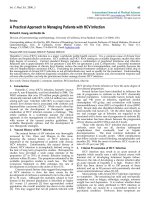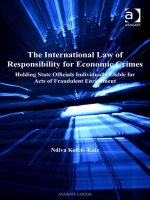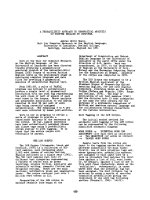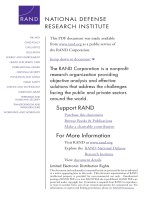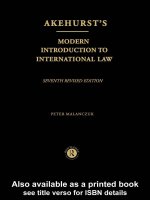A Foucauldian Approach to International Law Descriptive Thoughts for Normative Issues pot
Bạn đang xem bản rút gọn của tài liệu. Xem và tải ngay bản đầy đủ của tài liệu tại đây (508.68 KB, 163 trang )
A FOUCAULDIAN APPROACH TO
INTERNATIONAL LAW
This page intentionally left blank
A Foucauldian Approach
to International Law
Descriptive Thoughts for Normative Issues
LEONARD M. HAMMER
Senior Lecturer, Zefat College, Israel
© Leonard M. Hammer 2007
All rights reserved. No part of this publication may be reproduced, stored
in a retrieval system or transmitted in any form or by any means, electronic,
mechanical, photocopying, recording or otherwise without the prior permission
of the publisher.
Leonard M. Hammer has asserted his right under the Copyright, Designs and
Patents Act, 1988, to be identified as the author of this work.
Published by
Ashgate Publishing Limited Ashgate Publishing Company
Gower House Suite 420
Croft Road 101 Cherry Street
Aldershot Burlington, VT 05401-4405
Hampshire GU11 3HR USA
England
Ashgate website:
British Library Cataloguing in Publication Data
Hammer, Leonard M.
A Foucauldian approach to international law : descriptive
thoughts for normative issues
1. Foucault, Michel, 1926-1984 2. International law -
Philosophy 3. Normativity (Ethics)
I. Title
341'.01
Library of Congress Cataloging-in-Publication Data
Hammer, Leonard M.
A Foucauldian approach to international law : descriptive thoughts for
normative issues / by Leonard M. Hammer.
p. cm.
Includes bibliographical references and index.
ISBN-13: 978-0-7546-2356-4 (alk. paper) 1. International law. 2. Foucault,
Michel, 1926-1984. I. Title.
KZ3410.H36 2007
341 dc22
2006031578
ISBN: 978-07546-2356-4
Printed and bound in Great Britain by MPG Books Ltd, Bodmin, Cornwall.
Contents
Acknowledgements vii
1 Introduction 1
2 Theoretical Grounds for International Law 7
Introduction 7
Some Approaches Thus Far 9
Additional Approaches 13
An Alternative Angle 17
Conclusion 27
3 Recognition, Transformation, and Power 29
Introduction 29
Recognition and State Perspective 31
Recognition and Process 33
Alternative Recognition 39
Conclusion 47
4 Transgressing Problems of Customary International Law 49
Introduction 49
What is Customary International Law? 51
Reference to Foucault 60
Conclusion 68
5 A Descriptive Moment for Freedom of Religion or Belief 71
Introduction 71
Considering the Human Right to Freedom of Religion
or Belief 73
Individual Beliefs and Foucault 80
Implications for the Right to Freedom of Religion or Belief 91
Conclusion 95
A Foucauldian Approach to International Law
vi
6 Human Security from a Transformative Context 97
Introduction 97
Contrasting Human Security 99
Why Human Security 107
Human Security and an Alternative Approach 109
Conclusion 112
7 Non-Governmental Organizations and Power 115
Introduction 115
Global Civil Society Generally 117
Contending Issues and Problems 121
Reconsidering the Framework 124
Conclusion 128
8 Conclusion 129
Bibliography 135
International Documents 135
Judicial Decisions 136
Books 136
Articles 141
Index 149
Acknowledgements
A number of colleagues have been kind enough to have me present some
of these chapters as lectures, presentations at conferences, or simply to
discuss and reflect upon some of the ideas presented in the book. They
include Reza Banakar, Marshall Breger, Eyal Chowers, Robert Destro,
Gabriel Eckstein, Mathew Happold, Moshe Hirsh, Ruth Lapidoth, and
Gabriel Wilner. I appreciate their time and efforts on my behalf.
As promised, I dedicate this book to Alon, Ronit, and Gidon, along with
my unwitting muse, Sandy.
This page intentionally left blank
Chapter 1
Introduction
The purpose of this book is to offer alternative conceptions regarding the
operation and potential role of international law within the international
system. Via various notions proposed by Michel Foucault concerning our
methodological modes of perception and the role of discourse formations,
coupled with his approaches to power and knowledge, this book will shed
light on inherent inconsistencies, and begin to propose some form of
solutions, for a range of key topics within international law.
Referring to Foucault as a means of understanding and enhancing
international law at first glance seems counterproductive. Foucault
eschewed any notion of law or norms as maintaining an elevated position
when compared to other forms of social forces and attendant developments.
Further, he was involved in demonstrating methodologies that were de-
coupled from a formalised legal system or normative order, maintaining
(among other things) that analysis of these systems tended to ignore other
external realities and the underlying processes that actually served as the
driving force. An international system that tends to centralise the role of
the sovereign state for example is problematic for Foucault, where the
demand for a particular mode of analysis merits not only the incorporation
of other actors, but also a wholly distinct form of scrutiny.
Recognising such an attitude towards law however need not lead
to dismissing Foucault from consideration. Rather, it is important to
remember that Foucault was not necessarily offering a theory as such, but
rather analytic devices and forms of interpretation. Thus, one purpose in
referring to Foucault throughout this work is to allude to his descriptive
model as an avenue towards interpreting and further examining events and
existing conceptions within the international system. The goal is to create
a context for examination pursuant to Foucault’s notions regarding social
activity and forms of relations between the various actors.
Part of the difficulty with Foucault is that he provides questions, not
answers, given that answers are reflective of merely temporary perceptions.
Further, Foucault is linked to notions of disorder and resistance, preferring
A Foucauldian Approach to International Law
2
to consider the struggle and resistance surrounding interactions rather
than actual (unattainable) solutions. Thus, referring to Foucault does not
always imply an adoption of his ideas, but rather the means for initiating
the development of a new line of thought, thereby addressing an at times
chaotic international system beset by a host of influences and interests.
The unique nature of Foucault is that one can grasp a number of disparate
social developments and state concerns, and emerge with a context from
which to initiate the advancement of an interpretation.
The proposal herein is to identify a framework that will not necessarily
ameliorate all the various perceptions concerning international law,
but begin to offer the means for grasping the surrounding changes and
constantly shifting positions of the actors involved. International law is
essentially stuck either within an outmoded statist approach, or an overly
broad understanding of the significance of external actors like international
organizations whose standing and influence are not altogether clear.
Current interpretations of international law are rooted in a narrow attempt
to demonstrate a functioning normative structure, deconstruct international
law without offering a viable alternative, or interpret developments as
reflective of an emerging and somewhat unwieldy ethical, legitimate, or
constitutive (social) global order. The problem is that these approaches do
not fully capture the essence of the changes and shifts to the international
system nor allow for incorporation of different viewpoints and perspectives,
especially when moving towards a relative or localised approach or shying
away from a state-centric model. Additionally, it is interesting to consider
that despite grand claims for a changed world with greater integration and
broader representation, we are still beset by ethnic, religious, and national
conflicts that limit the capacities for an improved international process
and at times tend to create greater confusion within the desired normative
order.
As Foucault operated within a particular ethos of inquiry, reference to
his ideas can begin to extricate the international system from an overly
systematic analysis, while at the same time maintain some of the underlying
viability of an international normative order. Particularly, what is important
is not the standards or elements of international law as definitive factors,
but the manner by which the distinctions and associations are established
within a system or political sphere. Thus, it is imperative to address the
constant change and ongoing resistance of the international framework, a
difficult task for any system that intends to impose some form of normative
structure as a means of regulating the actors therein.
Introduction
3
For Foucault, the state is a creation of our discourses and is not
representative of a unified whole. Hence, power is coextensive with all
forms of relationships, the state being merely one aspect of such power
relationships given the possibility for influence of, as well as to be
influenced by, the actions of others. Further, Foucault proposed notions of
power and the relationship with knowledge that can assist the international
subsystem of non-state actors in understanding surrounding events without
necessarily abandoning the state and the international framework. Rather,
in line with Foucault’s descriptive approach, the goal is to consider a
framework of understanding that would enhance the international system
while at the same time allow for consideration of a variety of viewpoints.
Thus, the book considers the engagement of the ongoing shifts and changes
inherent in any politicised system as a means of discerning the contexts of
operation. The goal herein is to allow for methods that would consider a
broader context of operation from which to distil an understanding of what
is transpiring and developing in international law.
Each of the book chapters addresses various aspects of international
law from a Foucauldian perspective. The idea is to account for some of
the fundamental problems within international law, with the view towards
relying on Foucault’s understanding of the structure of society and manner
of interaction. The chapters then will assess and consider the underlying
problems posed by each doctrine, and offer an alternative approach and
treatment by which to consider the specific topic of the chapter.
Chapter 2 refers to international legal theory, considering a variety
of viewpoints and approaches to international law, including recent
assertions that have accounted for the incorporation of non-state actors as
well. Moving away from an overly critical analysis, the chapter will offer
Foucault’s transgressive approach to overall social relations, including his
understanding of the role of law and the state. Coupled with his perception
of power and knowledge as forming an ongoing re-interpretation of the
relevant relations, one emerges with an encapsulation of Foucault’s basic
notions that can assist an international system caught up in too narrow an
understanding of power and the role of the state, and broaden the context
of examination and operation. This chapter shall serve as the basis for
understanding Foucault and the manner by which he will be referred to
throughout the book.
The third chapter moves from theory to relations between states,
particularly regarding the manner by which a state might acquire
standing and personality within the international system via international
A Foucauldian Approach to International Law
4
recognition. Referring specifically to the recognition of states allows for
an accounting of a doctrine that operates in a political context, despite
attempts to accord it some form of normative status. A host of inadequately
considered external considerations and influences also maintain relevancy
for recognition. The proposal in Chapter 3 is to adhere to a process-
oriented form of recognition, one that commingles notions of politics and
policy with norms, with the process of recognition serving as the focus
rather than the eventual outcome between the states. Acknowledging that
recognition is essentially a matter of behavioural modulations (including
political factors that drive forward a decision) as well as a reflection of
relational power as understood by Foucault, one can emerge with a better
understanding of recognition and the manner by which it can be referred
to within the international system.
Chapter 4 addresses a key source of international law, that being
customary international law. Custom as a source of law possesses a host of
recurring fundamental problems, including the processes used to identify
the norm, the weight accorded the principal elements of custom, and its
actual application. Recognising that assertions pertaining to a customary
norm derive from subjective interpretations generally pursuant to a state’s
unique interests, custom does not necessarily represent the truth of the
assertion but is the result of the utilisation of emerging norms for use by
the state. Customary norms are subject to ongoing change due not only to
the subjective nature of the process, but also because external influences
outside the purview of the sovereign state continuously force alterations to
its composition and status. Hence it seems of greater beneficence to inquire
why a particular claim regarding custom reflects the so-called ‘truth’ of the
assertion at a given stage and how did one reach the point whereby an
individual, state or international body can maintain grounds for making an
assertion regarding the status of a customary norm.
Additionally, Chapter 4 will incorporate Foucault’s understanding
of discourse formations. Custom is not only a matter of ascertaining the
amorphous notion of practice among the states, but also is a reflection of
the social condition and historical development that serves to influence
and change the actions of a state and other relevant actors. The ‘discourse’
that forms a part of custom incorporates a broad gamut of international and
domestic actors, including the individual, non-governmental organisations,
the state, and international bodies. Asserted thoughts are treated as objects
in their own right, rather than examining the actual content of the thoughts,
with a view towards ascertaining and understanding the process by which
such assertions arose.
Introduction
5
Moving away from the state and towards other international aspects,
the remaining chapters shall examine more recent developments within the
international system that implicitly rely on a broader notion of international
law beyond the state. The issues to be examined incorporate other actors
and internationally developed norms both from a top-down approach, such
as international human rights as derived from treaties, as well as from a
bottom-up perspective, such as the role of non-governmental organisations
and the emergence of human security as a means for addressing some of
the current problems in the world at large.
Starting with international human rights, Chapter 5 considers the role
of human rights via reference to the right to freedom of religion or belief.
Freedom of religion or belief is a fundamental right beset by problems of
misapprehension and misapplication. Foucault is enlightening due to his
approach towards social relationships and development of human ideas,
such that all entities exercising power or espousing a human right are part
of a broader framework of social relations. Thus, the power of a human
right norm is not only that it represents a right per se, but also that it serves
as a form of producing individual and social reactions and furthering
the continuing social discourse. Particularly concerning the human right
to freedom of religion or belief, it is important to account for the social
dimensions that the right entails. Foucault’s approach to power then can
assist not only with positioning human rights within the international
system, but also to integrate an atomist oriented human rights system into
the broader social discourse.
Chapter 6 turns towards the notion of human security, a relatively
recent and still emerging concept that has been touted as an important
inroad into addressing a variety of concerns within the international
system. Specifically, human security has been identified for addressing
problems of less-developed states and the means by which to correct their
ills, as well as various normative lacunae within international law that has
been difficult to incorporate changed circumstances, such as within the
humanitarian law context. The problem has been one of context, especially
how to conform notions of human security into the international system.
Human security however serves a process-oriented function, focusing on
local necessities and recognising the role of a variety of actors according
to their specific needs. Such an approach involves the conceptualisation of
an operative method without necessarily being linked to a strict normative
framework. Thus, Foucault’s attitude to norms and his understanding of
power provides a strong contextual framework for the actual operation
and implementation of human security notions. Foucault recognises the
A Foucauldian Approach to International Law
6
capacity for a process-oriented context, without being weighed down by a
normative framework.
Chapter 7 engages newer paradigms within international law and the
manner by which they can assist the international system. Part of the
problem with the liberalist approach has been a lack of critique, an almost
complacent acceptance of the market oriented approach via a sound rule
of law as the sole means towards peace and stability. Turning specifically
to global civil society and non-governmental organisations, the goal of
the chapter is to account for what has been understood as new directions
within the international framework. Recognising in particular the variety
of problems associated with non-governmental organisations, especially
internal and external accountability issues, the chapter will offer the means
for engaging an approach to international relations and international law
that incorporates various non-state entities as viable actors. In particular,
Foucault’s understanding of power is quite apt here and assists the
international system in according an active role to the variety of players in
the global civil society framework.
The concluding chapter offers additional suggestions for further study
via the approach of Foucault. It is hoped that the book can serve as a
starting point from which to consider other aspects that have emerged
within the international system that can be better understood, leading to
better applications, via a Foucauldian perspective. As noted at the outset,
the goal is not to critically de-construct the international system, but to
explicate emerging concepts that have served to alter the underlying
structure of international law and international relations especially given
the emergence of new actors and concepts, such as to allow for a better
overall functioning system that properly addresses the needs of all actors
participating therein.
Chapter 2
Theoretical Grounds for
International Law
Introduction
Public international law is beset by issues questioning its legitimacy,
viability and at times the very existence of such law.
1
Even for those in the
1 For recent overviews of approaches to international law, or at least
representative examples of some of the different perspectives that have been
asserted, see Kingsbury, B. (2005), ‘The International Legal Order’, IILJ Working
Paper 2003/1 (History and Theory of International Law Series) available at: www.
iilj.org (relying on Grotius as a means to combine both the source and content
of the rules); Rajagopal, B. (2003), International Law from Below: Development,
Social Movements and Third World Resistance (Cambridge University Press, UK)
(social movements as a better reflection of international law and its development);
Raustiala, K. (2002), ‘The Architecture of International Cooperation:
Transgovernmental Networks and the Future of International Law’, 43 Va. J.
Intl. L. 1 (transgovernmental networks as a means of entrenching international
cooperation and liberal internationalism); Guzman, A. (2002), ‘A Compliance-
Based Theory of International Law’, 90 Calif. L. Rev. 1823 (compliance as
reflected by rational, self-interested, states); Stark, B. (2002), ‘After/word(s):
“Violations of Human Dignity” and Postmodern International Law’, 27 Yale J. Intl.
L. 315 (embracing the fragmented nature of public international law); Kennedy,
D. (2000), ‘When Renewal Repeats: Thinking Against the Box’, 32 N. Y. U. J.
Intl. L. and Pol. 335 ; Simpson, G. (2000), ‘The Situation on the International
Legal Theory Front: The Power of Rules and the Rule of Power’, 11 E. J. Intl. L.
439–465 (critiquing Byers, M. (1999), Custom, Power and the Power of Rules
(Oxford University Press, UK) and offering an overview of different approaches
within international law and international relations); Georgiev, D. (1993), ‘Politics
or Rule of Law: Deconstruction and Legitimacy in International Law’, 4 E. J.
Intl. L. 1–14 (referring to legitimacy as a means of grounding international
law); Allot, P. (1992), ‘Reconstituting Humanity – New International Law’, 3
E. J Intl. L. 219–252 (a cosmopolitan approach, asserting that law can actualize
social objectives); Carty (1991), ‘Critical International Law Recent Trends in the
Theory of International Law’, 2 E. J. Intl. L. 66–96 (adopting deconstructionist
approach, with goal of understanding allegations of states in terms of cultural pre-
suppositions); Koskenniemi, M. (1989), From Apology to Utopia: The Structure of
A Foucauldian Approach to International Law
8
international law field who recognize some form of consensual structure
or agreements between states, the issue of deeming international law as
‘law’ constantly lingers in the background. Notions of a universal system
are too easily dismissed due to instances where states have acted contrary
to a norm, assertions of relativism in the application of the law, or cries
of neo-colonialism deriving from a favoured leaning towards a Western
orientation within the international system. Similarly, consensus has
been too easily undermined by the will of hegemonic states or political
influencing within the confines of international organizations that stymies
the emergence of an international legal order.
Within the context of international relations, international law has
been caught between realist assertions of state interests as superseding
international law, institutionalists that accord some form of role for
international legal making organizations, or cosmopolitan assumptions of
moral state behaviour with a view towards the identification of an existing
social order. Each approach is of course beset with inherent problems,
whereby examples of state behaviour can be demonstrated to either prove
or disprove the asserted position. Thus, while international organizations
might actually serve to entrench international law or have some form
of norm-creating role, enough examples exist of states in the breach, or
counter-examples where an organization acted contrarily in a similar
situation, to call into question the notion of international law as law.
It seems that attempts at discerning the underlying drive of international
law has moved beyond the notion of universality or consensus, to one
of unearthing the differences between the players and treating inherent
conflicts as the reality. Alternatively, many have jumped on the realist
bandwagon, asserting that international law does not exist as such, acting as
a tool of the state and merely standing as a reflection of particular interests.
Less extreme realist views contend that while not wholly normative,
international law might reflect some form of underlying understanding
between states, recognizing that the application will be subject to the
relevant whims or interests of the state.
What have been difficult to consider are attempts to transgress this
seemingly dichotomous battle, be it between a critical and positivist
or consensualist approach, or between a universalist or cosmopolitan
view and a realist position. International law too easily succumbs to a
deconstructionist position or folds to realist assertions regarding the actual
International Legal Argument (Finnish Lawyers Pub. Comp., Helsinki) (critiquing
key approaches within international law, as discussed infra).
Theoretical Grounds for International Law
9
behaviour of states. Acknowledging that state discourse is latent with
political interests and inherent values makes it quite difficult to emerge
with a standard when accounting for the key sources of international law
that heavily rely on such discourse.
2
Part of the underlying problem has been considering a framework
for changes that have developed within international law over the past
century given the growth of international and regional organisations, a
move towards globalisation with its attendant local and international
effects (economic and social), and the rise in influence by actors external
to the state. The assertion herein, and throughout the rest of the book, is
that an alternative approach as dictated by the theories of Michel Foucault
can begin to address some of the problems. The proposal centres on a
framework that allows for inherent contradictions, given what can be
called a transformative understanding of the international system and a
transgressive approach to one’s perception of international society. The
advantage in referring to Foucault is the possibility to ameliorate contrasting
viewpoints by addressing the underlying changes to the system. A clearer
image of present day international law and the role of such law in the
international framework can be better elucidated.
Following a brief overview of some of the proposed approaches to
international law, this chapter shall offer a methodology to international
law considering it from a descriptive standpoint given an alternative
understanding of power and its link with knowledge, which will serve as a
blueprint for analysis of the specific issues in the ensuing chapters.
Some Approaches Thus Far
The problems identified with international law have centred on the
ambiguity of the process, given the link between international law and
political (along with legal) processes. Even more profoundly than in
domestic jurisdictions, where laws also result from a political process,
the international system is problematic because there is no actual ‘legal’
system; the states are creating the law for their own regulation. Thus,
unlike in domestic jurisdictions, enforcement aspects are lacking or are
weak to the point that the existence of some form of legal system per se
does not adequately exist.
2 See discussion infra at Chapter 4.
A Foucauldian Approach to International Law
10
This lack of a viable framework comparable to a domestic one is
rather frustrating for legally trained individuals. The infusion of inherently
contrasting state interests among the states leads to ambiguities in the
variety of documents and treaties that serve as sources for international
law. This usually is because such sources of law result from high-end
political negotiations where the goal is to protect and preserve the state
and its interests rather than solely create a viable and enforceable legal
norm.
Indeed, in attempting to address this problem of international law’s
open-ended nature, some have concluded that international law is inherently
ambiguous.
3
Following from this, international law is accused of being a
fragmented process and structure,
4
with little notion of state accountability,
thereby making any attempt at assessment a difficult exercise. International
lawyers are left to either assert their position pursuant to their pre-
determined interests or those of the state, or to acknowledge the inherent
problems and attempt to construct some form of viable ongoing system
that recognises international law.
Additionally, the lack of a network leads to inherent inconsistencies
within international law. That is, the law as such might derive from
a particular definitive source, like a treaty, but the state will pull the
particular norm or edict towards its own direction and towards a particular
meaning that best serves its interests. This of course brings to bear the
issues surrounding the place of international law and its role, if at all, in
the regulation of states and their actions.
International legal theories have proposed a number of approaches
by way of explaining what is happening within the international system.
For example, Koskenniemi places the framework of the issue within the
context of normative versus consensual endpoints.
5
A normative approach
recognises international law as operating to create specific norms that are
binding on the state. It is an attempt to identify an objective application of
international law to all the relevant actors (principally the states).
The attempt to objectify international law is problematic given the
political aspects that are implied by the system. Because international
law is founded on the notion of the will of states, the latter will tend to
cancel out any form of objectivity. Either international law is too political
3 Stark (2002); Carty (1991).
4 Stark (2002).
5 Koskenniemi (1989).
Theoretical Grounds for International Law
11
given the reference to state’s will and its capacity to assert power, or
international law is unrealistic given the tie to utopian ideals of normative
objectivity.
6
In essence, the claim is that international law would be hard
pressed to exist without some form of concreteness based on state’s will –
at least as a means of providing a social context. Presumably, a consensus
derives from the overall understanding of the various states involved. At
the same time however international law also must have some aspect of
objective normativity to allow for effective operation and application. Yet,
combining the two (concrete state will and objective normativity) proves
to be rather difficult given their pull in seemingly opposite directions.
Other attempts to identify the basis for international law have proposed
some form of dichotomous distinction. Thus, Kennedy frames the issue
within the context of the natural law approach and the imposition of some
form of objective standards, as opposed to a positivist understanding of
law dictated by the states.
7
Objective standards are linked to the so-called
natural law of states, thereby preventing anarchy and preserving some form
of state-to-state relations. A positivist understanding is looking more at the
interests of states and the actual means by which the process is carried out
in a practical, more realist, manner.
The former of course begs the question regarding objectivity, associated
with many of the challenges to the natural law approach regarding its
creation and identification. The problem is further heightened upon
factoring in non-Western states and relative approaches to law based on
religion, culture, or other epistemological differences. The latter positivist
approach raises the issue of consent among states and whether that is an
attainable outcome.
Kennedy frames the distinction as one of sovereign equality
(objectivity) as opposed to acknowledging sovereign authority. States
are either independent and acting without any overarching authority, or
are linked to notions of sovereign equality with the proper application of
international law when appropriate. Thus, one is stuck between doctrines
of law versus the actual practice of law, similar to Koskenniemi’s linking
the issue to concreteness (based on practice) versus normativity (based on
doctrine).
6 See also Koskenniemi, M. (1990) ‘The Politics of International Law’, 1 E.
J. Intl. L. 4–32.
7 For an outline of Kennedy’s ideas (and more), see Kennedy, D. (2000),
‘When Renewal Repeats: Thinking Against the Box’, 32 N. Y. U. J. Intl. L. and
Pol. 335.
A Foucauldian Approach to International Law
12
It is interesting to contrast various approaches proposed by international
relations scholars whose frameworks have at times been adopted by those
in the international law field. The division similarly perceives the role of
international law as either those of the realists, where international law
is merely a reflection of state interests, as opposed to the cosmopolitan
or institutionalist camps who ascribe some form of regulatory role to
international law or attempt to impose a value-laden system of consent.
Regime theorists for example understand international law as playing a
role in establishing order between states and international organisations
while institutionalists incorporate notions of normativity within the
law, recognizing the imposition of some form of objective standard on
a state. Recent international legal literature has recognized for example
the importance of social policies and various other forces that affect state
actions in a more nuanced manner,
8
as well as the advent of globalisation
that has moved the international framework away from a state-centric
orientation.
9
The realists link to state interests is in essence similar to the international
law approach of law as having only a causal role resulting from practice.
An amelioration of this realist framework can be found in a recent book
by Goldsmith and Posner where the authors interpret international law as
a reflection of state interests, such that the authors consider international
law as instrumental rational choices taken by states to further their power
and welfare.
10
Thus, there exists an inherent tension between different approaches
to international law that depends upon the desired interpretation one may
give to state relations, or to the creation of a legal framework meant to
regulate the actions of states.
Of course, there are positions in between these extremes where
commentators attempt to propose methods of combining between the
8 Berman, P. (2006), ‘Seeing Beyond the Limits of International Law’, 84
Tex. L. R. 1265 (given multiple affiliations within and without the state influencing
state policy, the overall vision of the international community is not solely a unitary
state choice regarding rational choice, but must account for the variety of voices
within an enlarged international framework).
9 See e.g. Garcia F. (2005), ‘Globalization and the Theory of International
Law’, B.C. Law School Faculty Papers, paper #93, available at: lco.
org/bc/bclsfp/papers/93.
10 Goldsmith, J. and Posner, E. (2005), The Limits of International Law
(Oxford University Press, NY).
Theoretical Grounds for International Law
13
objective/normative and the consensual/positive aspects. For example,
there are attempts to bridge the gap of normative objectivity and notions of
state interests via the role of legitimacy.
11
That is a legitimate assertion of an
objective norm can occur where there is consent among states that proper
procedures have been adhered to in creating and enforcing the norm. The
concrete aspect is met given adherence to necessary and valid procedures,
and the objective factor is upheld given the identification of a specific
norm. Thus, law is distinguished from politics where agreed to procedures
are followed which reflect accepted social behaviour (concreteness) and
that bring to the fore a state obligation (normative objectivity).
12
The problem with such an approach is that it does not remove the
value-laden notions inherent in the objective, normative, side because it
is clear that the definition or identification of such a norm is inherently
linked to the values and interpretations of each state party. One might
identify legitimacy via external factors such as the concreteness of a
norm, however attaining some form of broader or universal understanding
regarding the status or existence of a norm will doubtless be subject to
ongoing debate and at the mercy of the subjective interests of the entity
making the assertion.
Similarly, the notion of a legitimate form of consent-creating procedure
will be inherently linked to a specific understanding or perception of each
state, usually depending on their interests at stake or their policy and
political goals. It seems that legitimacy theory as grounds for state action
becomes a result-oriented process that removes attention from the actual
techniques and tactics used by the state to achieve the result.
13
Any sense
of amelioration does not address the problems with international law, but
actually seems to heighten them.
Additional Approaches
One of the key methods for considering international law and its potential
link to other disciplines, in particular international relations, has been the
emergence of sociological models of international law. The focus has been
a strive to combine realism and the importance of state interests with some
11 The turn to legitimacy generally relies on the work of Frank, T. (1990), The
Power of Legitimacy Among Nations (Oxford University Press, UK).
12 See e.g. Georgiev (1993).
13 Hunt, A. and Wickham G. (1994), Foucault and Law: Towards a Sociology
of Law as Governance (Pluto Press, London) at 16–17.
A Foucauldian Approach to International Law
14
form of cosmopolitan or consensual understanding of international law
that recognizes the co-existence of both aspects in a structured manner,
thereby developing a sound normative system of international law.
An important approach to international law has been an inter-disciplinary
consideration, turning specifically to international relations as a source of
inspiration and explication. By way of example, Byers has been a strong
proponent of integrating international relations with international law to
achieve some form of consensual standard.
14
Essentially, Byers proposes
an accounting for the collective notions of states based on their consensus
of what is legally relevant. This is an important inroad into expanding
international law to incorporate important factors that influence and even
determine the normative elements of the law. It also acknowledges some
form of independent causal role for international law, beyond the confines
of a realist interpretation, by attempting to identify the factors that go
into the composition of law and its creation of some form of international
social order
A similar approach is noted by a compliance-based theory of
international law.
15
The basic notion of a compliance system, again
referring to the international relations model, is that because states act in
a self-interested manner, there are instances where they will comply with
international law when it is beneficial to do so.
16
The problems identified with these approaches are similar to the
aforementioned issues regarding legitimacy doctrine. That is, in a practical
sense, how is one to assess the legal relevance of a collective belief? Further,
how is one to even identify some form of consensus let alone legitimise
such a consensus?
17
The notion of legitimizing an emerging consensus
does not remove the inherent values (or interests) of states that have
formed the crux of the realist critique. Indeed, one can assert that referring
to collective notions of states based on consensus entrenches Western
oriented approaches, providing a platform for the more powerful states
and removing the objective, normative, content that is being sought.
14 Byers (1999).
15 Guzman (2002).
16 Guzman (2002) elaborates on the compliance theory by demonstrating
how it is more conducive to developing viable customary international law, rather
than relying on the traditional elements that do not capture the essence of state
interests.
17 See e.g. Simpson (2000).
Theoretical Grounds for International Law
15
Taking the analysis a step further have been proposals centring on
sociological models of sovereignty. While the state as a realist entity is
pursuing its interests, there also are social norms that serve a constructive
function, especially influential on states when accounting for important
social institutions. Thus, the argument goes, states are not the sole
determinants of their construct, but also result from global cultural models
via cultural processes that are organized at the global level.
The central focus in this constructive approach is the effects of
institutions such as international organisations on states.
18
International
law develops due to the isomorphic nature of the state, an entity that
has been shaped by cultural processes, such that states will combine to
promote globally legitimate goals, like human rights or protecting the
environment.
19
In a sense this understanding mirrors the proposal enunciated by Carty
that states are linked by a competing community paradigm, whereby there
is no final or determinative answer as such to the issue of international law
and its identification; rather the occasional normative solutions are to be
bridged by an understanding of the cultural pre-suppositions of the actors.
20
The notion of looking at global cultural models furthers an understanding
of the cultural suppositions, thereby entrenching a better understanding of
the process and possible outcome for international law.
The proposed model however seems to shy away from the inherent
tensions that exist within the international framework. That is, even
if states are commendably promoting globally legitimate goals, such
as upholding protection for the environment, it is still the states that
are violating these obligations. The proposal does not go far enough in
examining the significance of this global to state relationship as a means
of defining international law nor in addressing the underlying meaning
of a cultural construct outside of a Western-oriented model. The tension
of normative objectivity versus consensual understanding of international
law still exists, even with a broader explanation that refers to cultural
presuppositions.
18 See e.g. Goodman, R. and Jenks, D. (2003), ‘Towards an Institutional
Theory of Sovereignty’, 55 Stan. L. Rev. 1749.
19 See also Allot (1992), noting that the goal of law within society is to
actualize the underlying social objectives that define a society.
20 Carty (1991).
A Foucauldian Approach to International Law
16
Another approach, albeit somewhat mirroring notions of managerialism
within the international relations context, has been to examine
transgovernmental networks as part of the international law process.
21
The understanding is that the state exists in a disaggregated form due to
greater interactions and economic reliance between states. Coupled with
a seemingly better form of treaty compliance, one achieves a sounder
form of international law. Similar to the compliance theory where rational
self-interested states will be inclined to uphold international law, the
understanding is that the emergence of actors other than states will serve
to entrench international norms in state-state relations. The call for better
treaty compliance for example is understood to provide the normative
basis for upholding the international norms that are developing.
This approach is interesting in that it begins to recognize actors other
than states as applying a functional and formative role in the international
process.
22
What is emerging from such views is the notion that states are
not the central or even dominant player in international law given the
inherent influences that derive from globalisation, forcing the state to look
beyond its self to determine norms and assess its actions.
Another key benefit of the aforementioned proposal is that it reflects
an understanding of international law that allows for the development of
a system in constant flux. The inherent tension within international law
where some form of normative standard is sought for a system beset
by issues of consent and state interests can begin to be understood and
addressed.
Nonetheless, the approach is still rooted within the basic dichotomy
that haunts international law – that being the normative objective notion,
presumably being derived from treaties that have stronger compliance,
and the issue of state interests, that being reliance on organizations that
essentially mirror a Western orientation or are constantly subject to the
whims of hegemonic states given the overlying context of realpolitik.
What we are left with are various attempts to either ameliorate the two
contrasting notions, or explanations regarding why one aspect, like
transgovernmentalism, will be addressed by the other, such as stronger
treaty compliance. Yet we are still trapped within the dichotomous circle,
21 Raustiala, K. (2002), ‘The Architecture of International Cooperation
Transgovernmental Networks and the Future of International Law’, 43 Va. J. Intl.
L. 1.
22 Hobe, S. (2002), ‘The Era of Globalisation as a Challenge to International
Law’, 40 Duq. L. Rev. 655.
